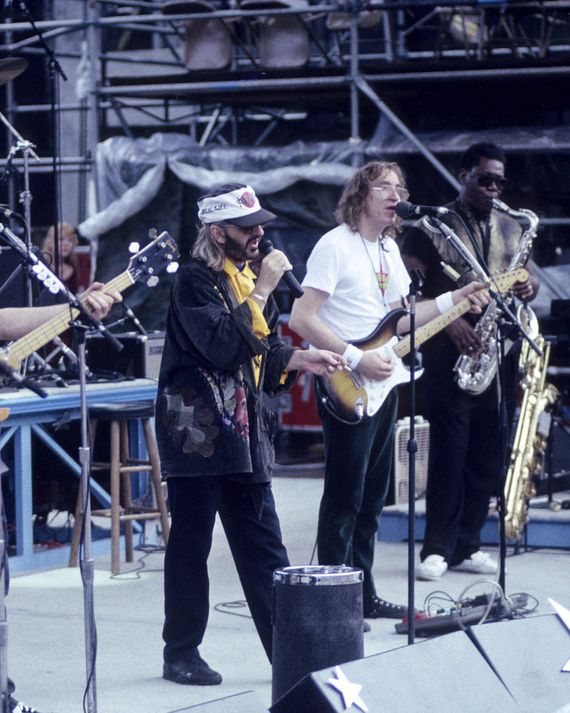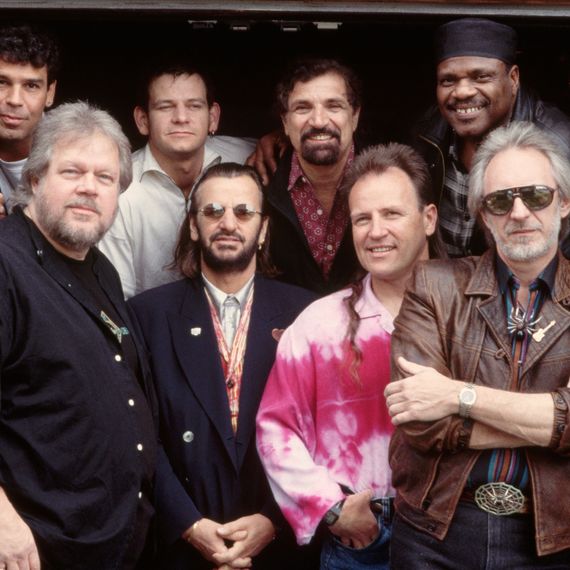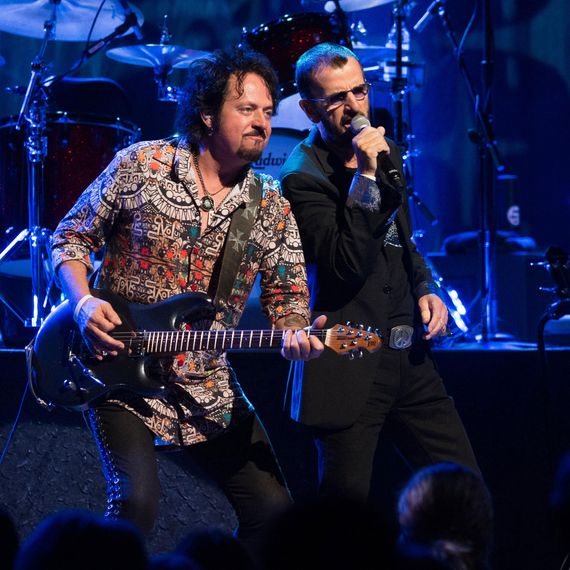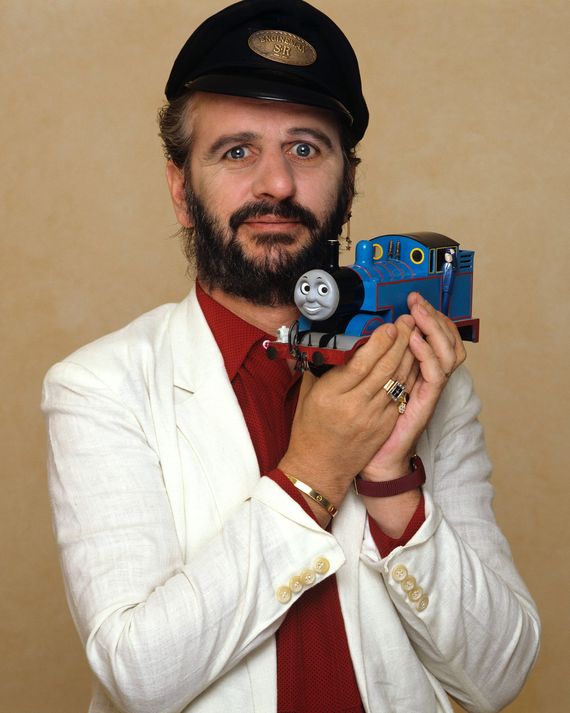
Ringo Starr. What else remains to be said about him? He was in that band with his friends. He’s now in that other band with his friends. The extra r is for extra talent. Actually, here’s one new thing: The drummer turns 83 on July 7, even though when you remind him of the number he’ll disagree and say “it’s actually 27.” (He thanks broccoli and a “small gym” for his relentlessly youthful disposition.) To celebrate his Saturn’s return of a birthday, Starr encourages everyone to pass along peaceful and loving vibes into the universe, a tradition that dates back to his inaugural Peace & Love Celebration in 2008. So take take a deep breath, throw on some Revolver, and try to transmit them his way at noon. Starr promises he’ll feel them.
I was recently blessed with a trifecta of Ringos on a video call. There was the real Richard Starkey front and center — wearing his sunglasses and a peace-sign necklace — as well as a Santa hat-clad cutout on his left and a large copy of a Change the World vinyl on his right. “This was a little guest house we have and I’ve turned it into my studio,” he explains. “All the records I’ve made for the last 12 years we made here.” He’s in the mood to reminisce about his career for a bit, but also wouldn’t mind the occasional banter beyond his history with the Beatles. (“My mother didn’t call me Liverpool,” he jokes of my name’s origin.) Passage of time aside, Starr continues to thrive with a little help from his friends.
Career-defining song
Because it was the first song, my answer is “Love Me Do.” We were on vinyl. We made a record. Even though when I got to the studio, George Martin had a session guy for the drums, Andy White, but I played on it anyway. He played it, I played it — he’s on the album, I think, and I’m on the single, so go figure. We were just blessed that George Martin took a chance on us because many record labels sent us down. But the fun was the fact that we were still touring. And only the BBC was playing the song. It would say, “Oh, at 3:14 p.m., this song will be on the BBC.” So we’d all pull over and think, Wow, we’re on the radio. I mean, it was a really big moment. It was magic because we were on this piece of vinyl all to ourselves.
A lot of tracks we did after that I loved, of course. The “Love Me Do” arrangement just came out of our heads. We didn’t read music. We were buskers. There’s nothing quite like the first. George Martin apologized every time I met him after we recorded that song. He would say, “I’m sorry, Ringo,” because he didn’t know that we changed drummers.
Most underrated Beatles drumming performance
Well, that’s hard. There are so many great songs — so many rock songs or ballads that I just sit down and play. That’s one of the good things in the Peter Jackson documentary. It’s long. But while they’re writing the songs, I’m holding the tempo. And then, when the song is finished, I can do my stuff. That’s because I’ll know where they’re going to sing and I try not to play over the singer like some other drummers do. I can’t do that drum fill twice. It’s mad because it comes off as an emotion. It’s not like, “Okay, three and a half bars, then you go boom, boom.” I’ve never played like that. I play how it feels. And sometimes, it feels like the fill is there, and sometimes it feels like, oh, no, actually the fill’s there. It’s just what I do. That’s how I play. I’m not thinking of anyone else but the track. With those three boys, we were psychic. Even with the headphones on and not looking — eyes closed, playing away — you’d know it’s going to move here. Bang, and okay, pull it back. It’s like we didn’t have to talk to each other. Once we had the count in, we knew what we did.
Song that gives you the most joy to perform live
“Boys.” I’ve been doing it forever and it’s a girl’s song. A wonderful girl group called the Shirelles did the original. I was performing it with Rory Storm and the Hurricanes before the Beatles, and it just rocks. It makes me smile that I’m still doing this song after all these years.
Favorite Beatles conspiracy theory
We only ever had one that stuck. That was “Paul is dead.” And there were some songs people pointed out as being “secret.” John, by accident, learned how to play a tape backwards, and we put that to full use. So we’d just do something silly at the end of a track and it’d be all over the newspapers and on the radio. They’re actually singing, “Blah, blah, blah, blah, blah, blah.” It just made us all laugh. All of those interesting things we said were not that interesting. We had a great laugh about that. Look at what they’re saying now.
Your dream recruit for the All-Starr Band would be …



Every one of those people on our stage have said yes. I’ve never received a no. I remember my first call was to Joe Walsh and everyone else followed. Now I have to put the phone book down because everybody says yes. It was mad in its way, but the band was great. We played two or three tours with the first All-Starrs and we even went to Japan. Then I thought, Well, I’m going to change the whole band now. Then I played with that band, we did a couple of tours, and then I decided again, I’m going to change the whole band now. Which was very hard when I now think about it, because the rehearsals were always difficult. A lot of these musicians had never even met. So we had to really get it down. No time to goof around. After that iteration I realized the extent of how hard it was and I said, “I’m just going to change two of them going forward.” That’s how it’s been now. We’ll see how long this band lasts. There’s no set time. We’ve added quite a few years with a few changes, but basically it’s the same band. We’ll wait and see.
How you were convinced to become Thomas the Tank Engine’s inaugural narrator
That was a really wonderful job. The show’s producer came to me with the idea. She said, “We’ve got this book, Thomas & Friends, and we’d like you to narrate it.” I’d never done that stuff before so I was confused when I was approached about it. My kids were into spaceships and stuff like that. Actually, in hindsight, I don’t remember my kids being into a lot of children’s stuff. I thought, Well, I’ve never done narration. I don’t feel I’m going to be good at it. So I sat around for a week. We had a studio in the house at the time, and I just thought, All right, what the hell, I’m going to go and read four stories and send it to them, and if they like it, I’ll do the gig. And they liked it.
It became a lot of stories. The good news about Thomas is it was fun. With the big engines, you could put your body into it. I wasn’t following anybody’s lead. We did the stories in England, and then it turned into filming it in New York. That’s when it became a TV show — I was like two feet tall, or even less at 18 inches, with the kids, and we could react to each other. But then after four years, it’s like, “I’ve done enough. Thank you.” So I ended it, and we went out to a nice dinner in New York and I said good-bye to everybody. The mid-’80s were an interesting period in my life. During Thomas, I was playing music and trying to make records, but I wasn’t playing live. Then I wasn’t making records at all, and then everything changed again. Life has a rich pattern of changing. Out of the blue, someone reached out to my lawyer here in Los Angeles and they wondered if I would do a tour. I had nothing better to do. No more Thomas. I said, “Sure.” And then I thought, What are you going to do? And I thought again, I’m just going to call a lot of players up, and I asked them if they wanted to come on the road. All the ones onstage said yes, and that’s how the All-Starr Band started.
Your stream-of-consciousness while watching Get Back’s “Octopus’s Garden” scene
It’s emotional for me to watch. The first time I watched that scene … well, I can play any song you’d like as long as it’s in C on the piano. Keep that in mind. I’d actually left the band and gone to Sardinia for a holiday in 1968, and Peter Sellers’s boat just happened to be there. Maureen and I and the kids went on his boat, and the captain was talking to me. I’m afraid we were smoking a bit of dope in those days — a bit of grass. So it was all so nice and beautiful, and he told me the story about how octopuses have their own special gardens under the sea. When you’re stoned, how do you react? “Wow! Wow!” On the boat I had a guitar, and I could play anything you’d like in that as long as it was in E. It was the only chord change I knew. “I’d like to be under the sea in an octopus’s garden in the shade” just came to me. It was just one of those magic moments. I mean, what if the captain said, “Sharks like live dogs for dinner?” Happy-go-lucky sharks.
I got a few of those verses, and when I went back to the studio — because it was in C — George was sitting there and took an interest. He said, “F flat, D minor,” whatever. Nowhere I could go. I don’t know these chords. I’m a 12-bar guy. And then, he gets up, and you see that footage you’ve experienced. He always helped out, George. It was great. I miss him every day.
More From The Superlative Series
- Hans Zimmer on His Most Unusual and Underrated Scores
- The Coolest and Craziest of TLC, According to Chilli
- Kim Deal on Her Coolest and Most Vulnerable Music



